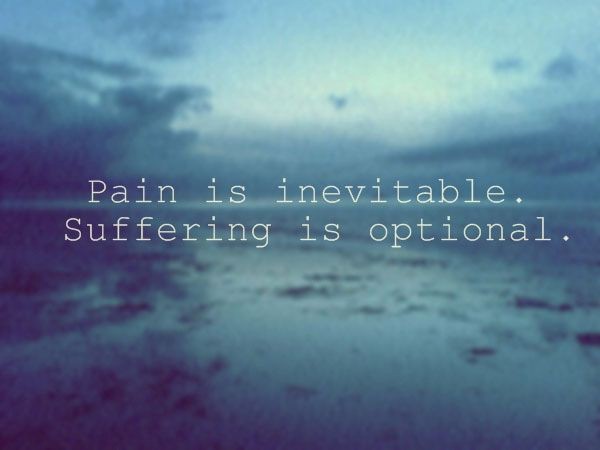Seeking happiness seems to be the thing to do. These are the messages all around us: Go on this holiday to be happy. Eat this food to be happy. Get this job to be happy. Have the perfect family life to be happy. The research would say we’re wired to go towards pleasure and away from pain and therefore we should seek a life with maximum happiness. But could this be an over-worked concept that isn’t serving us?
Too much of anything is generally now seen as a bad thing. Even if it’s exercise and drinking smoothies. But have you considered that too much happiness is a bad thing? Or at least attaching to it as an essential part of your existence is.
I fell into the trap again recently of believing that my experience of life should be nice, easy and happy with harmonious relationships in every aspect. I was attached to that as the “right” outcome for life. Then, surprise surprise, I began to suffer because my life wasn’t and isn’t that. These concepts don’t stand up to the truth of life. They are but paper boxes of ideas in the river of experience. Floating along for a while but inevitably subject to the turbulence and transience of the water around them.
In my work as a coach I previously most closely aligned to the field of positive psychology and the belief that, to overcome our prevalence to hold onto bad experiences, we need to focus on the good, go towards pleasure, seek out the things that make us happy. Now I see that being OK with all experience is the place where freedom lies. Let me share what I see…
“Holding onto the bad” was a great design feature required when surviving in the jungle, when remembering where the tiger lived was way more important to survival than remembering where the pretty flowers were, and where going towards a tribe, food, shelter and water to bring “happiness” or pleasure were very useful when the context you’re in is face-to-face with the realities of “stay alive or die”.
Following our instincts like that is perfect. Like other animals we have an in-built design to move towards staying alive which keeps us hydrated and fed in whatever way we can within the context we live. That is still in us now.
But like so many “5 top tips for success” lists, our conceptual mind has taken that great idea which is perfect for that purpose and that context, and tried to transplant it into every area of life. The conceptual mind doesn’t realise we have an in-built design feature which is more than capable of providing other great ideas for other contexts.
Instead, it cookie-cutters its way through life believing that “happy” and “pleasure” = good and “sad” and “pain” = bad and therefore it believes that to literally stay alive, we need to maximise the former and minimise the latter. It also believes that happiness is to be found “out there” and that an amount can be found to make it feel ok.
None of it true.
We will all experience pain, sadness, anger, frustration.
Our system is designed for us to feel those things when we believe a thought that says there’s something to be sad, angry or frustrated about. These feelings are entirely normal. We will experience them. This is the inevitability of pain.
But they don’t need to mean anything. They don’t say anything about us and our life. They don’t need to cause us to suffer.
We’ve made up what counts as “happy” and “sad” and which we broadly all agree on but within which I will have different definitions to you. For example, someone who has experienced depression for a number of years, might count happiness as getting up and sitting in the garden, enjoying the fresh air. For another it’s skydiving over the himalayas while sipping champagne.
Whatever we define it as, if we make that definition fixed, believe it to be true and believe it is essential to our survival, we will suffer.
These definitions are not true.
They can’t be. Truths are things which are “in accordance with fact or reality”. There are no “facts” here. Everyone’s experience of happiness and sadness is different, and what indeed is “reality”. We each live in our own personal experiences of reality so there ain’t no truth there either!
All we’ve done is create boxes around things which can’t be contained. We’ve over-worked the design feature that is perfect for meeting our basic needs. We’ve forgotten that happiness is our innate state if not for our box-like thinking. And we’ve forgotten that these boxes labelled “how life should be” are made of thought. They’re paper-thin. Thinner than paper-thin!
As soon as we see this, they tumble into the flow of the river and quietly disappear. Calm and clarity return, and we may still feel sad, but it leaves space for that in-built wisdom and insight, which is inside all of us, to be heard. This will give us the perfect information for this perfect moment. No recycling. No over-working something which was perfect for the moment before. Perfect for this moment now. Guiding us back to our innate wellbeing.
And then paradoxically, the less we care about what kind of experience we’re having, the more we have a nice experience of life, an easier experience, a happier experience. Suffering becomes less of a feature on the landscape. It’s worth a go!
And pain might return. It might be inevitable. But suffering is definitely optional.
Notice what you’re attaching to.
Notice what you’re believing about how life “should” be.
Notice where you believe happiness can and should be found in something outside of you.
Know that none of it is true and that there’s something better on the other side.
With love, Helen
I work with people who want a quieter mind and a more fulfilling life. They’re smart, passionate people who are curious about there being a better way. They’ve worked hard to get to here and yet something’s still missing: ‘is this it?’. In our work we explore and reconnect you to innate brilliance so you rediscover the real happiness, real security and real balance that you are. Find out more here.

